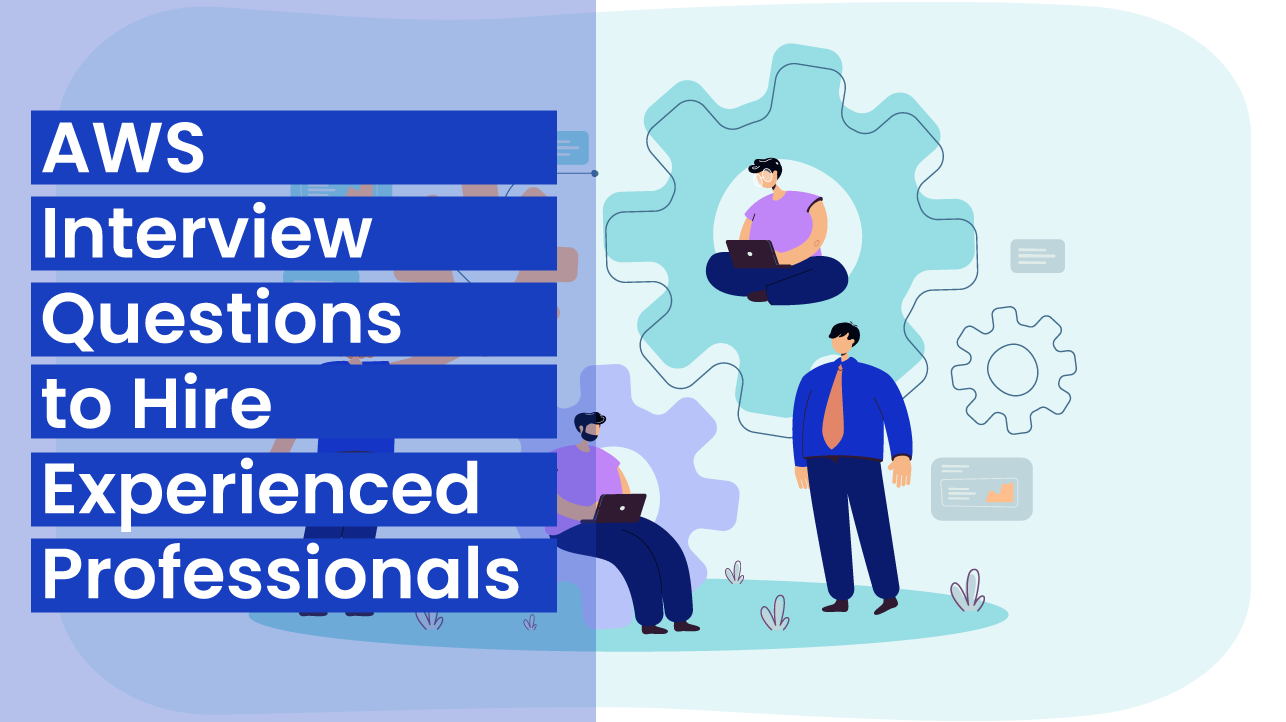 AWS (Amazon Web Services) is a dynamic cloud computing platform that offers a diverse set of tools for development, data storage, deployment, etc. Because of the nature of the role, AWS developers are always in demand, and recruiters, then, keep on the lookout to make hiring experienced professionals easier. So, in this short article, we'll provide you the necessary AWS Interview Questions and discuss the best practices to hire.
AWS (Amazon Web Services) is a dynamic cloud computing platform that offers a diverse set of tools for development, data storage, deployment, etc. Because of the nature of the role, AWS developers are always in demand, and recruiters, then, keep on the lookout to make hiring experienced professionals easier. So, in this short article, we'll provide you the necessary AWS Interview Questions and discuss the best practices to hire.
But what exactly is AWS?
In layman's terms, AWS is a set of simple but powerful cloud storage services that include powerful analytic tools. As in recent times, organizations have experienced a rapid growth in the transformation of the E-commerce sector with various services and cloud computing technological advancements, which naturally means there’s a great demand of AWS Developers. Therefore, to help start-ups to well-established enterprises, AWS has come up with some of the best cloud storage services. It assists in achieving internet-based growth, security, & scalability by reducing the expense of the hardware infrastructure.
To help you in creating a team that's equipped with all the necessary skills, here are some of the most important skills along with the set of AWS interview questions to ease up the interview preparation process.
Top Required Skills to Assess While Hiring AWS Recruiter
Operating System and App Stack Management:
AWS developers should have a basic overview of AWS cloud-formation and managed services using which one can model and provision the resources required for applications across all regions and accounts. As using the CloudFormation models and stacks, it can be achieved in an automated and safe manner.
Database and Configuration Tracking:
The Developer for your project should be well-versed in the use of type of database service to set up, operate, and scale a relational database in the cloud. They should also be aware of an automating time-consuming administration tasks such as hardware provisioning, database setup, patching and backups, etc.
Data Engineering:
A data management engineer is the one who creates and maintains data infrastructure and retrieval workflows. They are in charge of coordinating the processing of new data as well as the refining of existing data sources to take control of the data knowledge and quality for the pipelines.
Brief Knowledge of Tools & Technologies:
Regardless of where you are in the software development process, new tools, and technology are getting launched almost every day. Hence, AWS DevOps engineers must have a wide understanding of new technologies, building smaller on-demand applications that are responsive to events and new information.
Testing Skills:
Automation of code and its deployment can be a nerve-wracking process at times. But with careful testing, each function can be kept intact as new features are implemented every day. Hence, an AWS developer needs to have a basic testing skill.
Manage Elastic Computing:
AWS developer must have a brief idea about EBS volumes and EBS volume encryptions. Along with EBS solution concept and troubleshooting experience, its beneficial if the developer has an overview about the in-disaster recovery, design, and hibernation.
Knowledge of AWS VPC:
Developers should be able to work with VPC properties and be familiar with connection settings and diagnostics. They may also have strong troubleshooting abilities and a thorough understanding of network encryption and security.
These are some of the top required skills that every AWS developer must have. Also they should have a keen knowledge about debugging, databases, an overview of AWS software development kit, etc.
Moving ahead, let's know about the AWS interview questions to be prepared to hire AWS developers easily.
Top AWS Interview Questions to Spot Excellent Candidates
Common Interview Questions
- Tell us about yourself.
- What attracted you to our company?
- Give me at least 3 points explaining why should we hire you?
- Brief us about your strengths and weakness.
- How do you deal while working under pressure for any project?
Technical AWS Interview Questions
- What do you know about AWS?
- Define and explain the three basic types of cloud services and the AWS products that are built based on them?
- What knowledge and experience do you have about AWS applications, concepts, and functions?
- Do you have any experience in Ansible and Jenkins?
- Have you ever worked on Java and Python?
- Do you have the ability to work on the serverless application model
- Have you ever worked on AWS CloudFormation templates & stacks?
- Do you know how to design, implement, and migrate the systems using AWS?
- What all programming languages you aware of? What according to you are the top trending programming languages in the cloud transformation?
- What do one mean by geo-targeting in CloudFront?
- Which all steps are involved in a CloudFormation Solution?
- How can one recover/log-in to an Amazon EC2 instances for which they have lost the key?
- Name and explain some security products and feature available in VPC?
- How is AWS CloudFormation different from AWS Elastic Beanstalk?
- What are the native AWS Security logging capabilities?
- What according to you is the role of an AWS IAM in a company?
- Name some of the AWS services that are not region-specific
- How can you use AWS WAF in monitoring your AWS applications?
- What are the different AWS IAM categories that you can control?
- What is a maintenance window in Amazon RDS? Will your DB instance be available during maintenance events?
These aforementioned AWS interview questions are some of the commonly asked questions to an AWS developer in an interview. Although, these questions will definitely help in preparing the questionnaire well for the interview, but wouldn't in analysing the complete skill of the candidate. Therefore, create a detailed assessment to assess the practical skills of your candidates; you can also check out iMocha's AWS Online test here.
To know how you can ace technical hiring during these WFH times, visit here.


